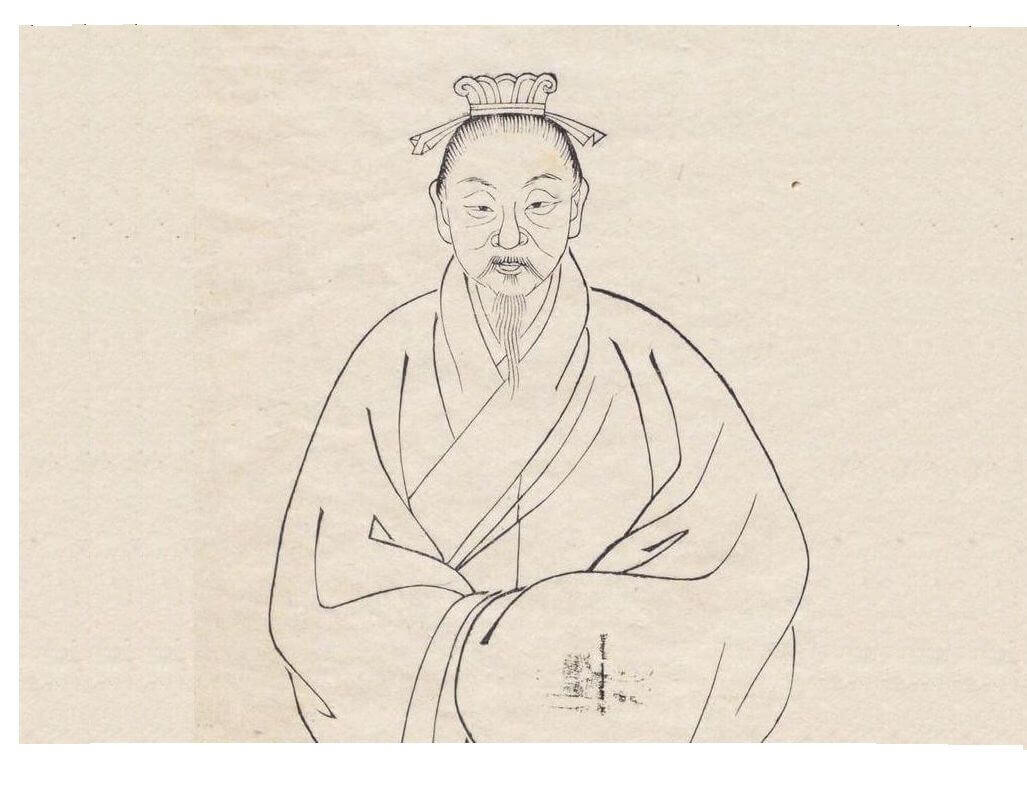Life
Guan Zhong (720 – 645 BCE) is one of the earliest named Chinese philosophers. He became Chancellor in the state of Qi, and was the traditionally cited as the author of a book called the Guanzi (or ‘Master Guan’), a vast treatise on statecraft, economics, politics and philosophy.
However, the evidence is that early versions of the Guanzi probably date back only to the second century BCE, and the text as it has come down to us was complied in the first century BCE by a scholar called Liu Xiang. This means that almost no material in the Guanzi can be reliably said to be authored by Guan Zhong. Nevertheless, the fact that such a vast, sprawling treatise on politics, economics and philosophy should be attributed to Guan Zhong shows his symbolic importance as a political thinker for later generations.
Guan and Bao
One of the main sources for Guan Zhong’s life is the Shiji or the Records of the Grand Historian by Sima Qian, completed around five hundred years after Guan’s death.
Sima Qian is always more entertaining than he is reliable. One of the stories he tells is of Guan Zhong’s long-standing friendship with Bao Shuya. Guan was brought up in poverty, but the much more well-off Bao recognised his sharp mind and his talent, and befriended him.
In 685 BCE, at the end of a bloody three-year civil war in Qi, Guan found himself on the losing side. He attempted unsuccessfully to assassinate Prince Xiaobai. And when the Prince seized control of the reins of power and was anointed Duke Huan of Qi, Guan was taken prisoner. After his arrest, Guan was threatened with execution. Bao, who was on the winning side, intervened on Guan’s behalf, and persuaded the Duke to appoint his friend to the role of Chancellor. The Duke relented, and Guan Zhong’s life was spared.
Political and economic reforms
Once appointed, Guan put in place a wide range of technocratic reforms that considerably increased the power of the state of Qi. His reforms included the introduction of compulsory military service, the issuing of coinage, the standardization of measurements throughout the state of Qi, and extensive tax reforms. He also centralized the management of iron and salt reserves, bringing these under the control of the state.
Philosophy
Guan’s greatest political legacy was a considerably strengthened state of Qi. But his philosophical legacy is harder to establish. Despite — or perhaps because of — his political success, he remained a controversial figure for later philosophers.
Confucius on Guan Zhong
Confucius was born a century after Guan Zhong’s death, and Guan appears several times in Confucius’s Analects. But Confucius clearly had a hard time working Guan out.
At one point in the Analects, Confucius complains about Guan’s lack of ritual propriety, asking acidly, ‘If Guan Zhong can be said to understand ritual, who does not understand it?’ But later on, when Confucius’s disciple Zigong calls Guan out for switching sides in the civil war, Confucius steps in to defend him, saying that despite his initial impropriety,
Without Guan Zhong, we would all be wearing our hair loose, and our robes folded on the left! So would it be better if he had gone and drowned himself in a ditch..? — Analects, Confucius.
It is a strange passage; but what Confucius is saying is that thanks to Guan Zhong’s reforms, later generations have enjoyed a more orderly and harmonious society. What, then, would be better? That Guan Zhong had never lived (and everybody wore their hair loose)? Or that he had lived with some impropriety, but put in place a legacy of a better world (and better hair) for those who came after him?
The roots of legalism?
Guan Zhong is often associated with the Chinese philosophy known as ’legalism’. The term is a controversial one. It was invented by Sima Tan, the father of the historian Sima Qian, and is associated in particular with the rise of the Qin dynasty from 247 BCE.
In Chinese, the word for legalism is fajia (法家). Fa can mean ’law’ or ‘method’, and jia means ‘school’, as in philosophical school. This means that fajia could be translated as ’the school of law,’ or ’the school of method.’ But fa can equally mean something like ‘following a particular course,’ or ‘following a specific model.’ So fajia could also be said to be the philosophy school that is committed to finding more efficient models for governing.
The term ’legalism’ is normally used as a catch-all term for a range of philosophical approaches concerned with questions of statecraft, bureaucracy and the design of models for effective government. Many legalist approaches are based on the idea that harsh laws are required for society to function. It is for this reason that ’legalism’ or fajia is sometimes used as a term of abuse, as a way of criticizing political approaches that seem excessively rigid and harsh, and that rely on systems of rewards and punishments for maintaining order.
Whether or not the term ’legalism’ is useful for understanding early Chinese philosophy, many scholars still see Guan Zhong as an innovator in political thought. He was the first to act on the idea that good government involves the systematic technocratic control of resources, territory, taxation and populations, introducing a novel approach to political philosophy into the Chinese tradition.
Further Reading
Books
The Guanzi is translated into English by W. Allyn Rickett (Princeton University Press 2001), although it pays to remember that its connection with Guan Zhong may be tenuous.
You can find the material on Guan Zhong in chapters 3 and 14 of Confucius’s Analects. I particularly like the translation by Edward Slingerland (Hackett 2003)
Online Resources
If you want to read in more detail about the political and economic ideas in the Guanzi, try this article on ‘the heavy and the light’ from historian Kevin Wilson.
For later Chinese legalism around the Qin dynasty, try this episode of In Our Time on the BBC.



